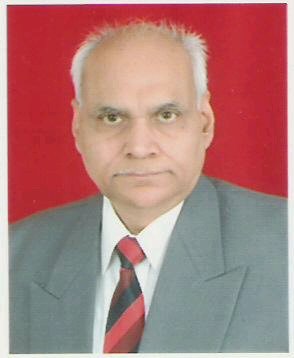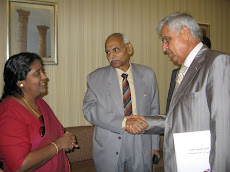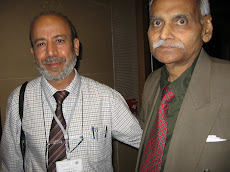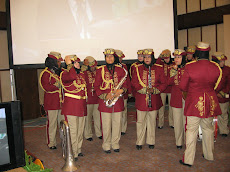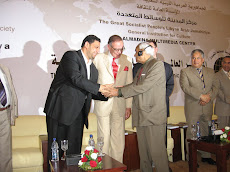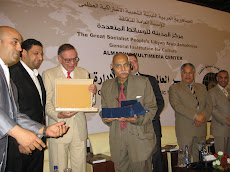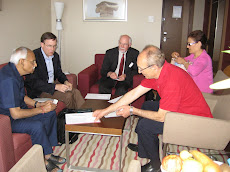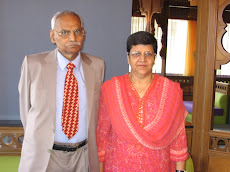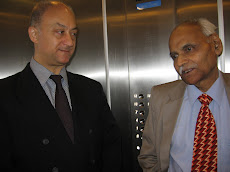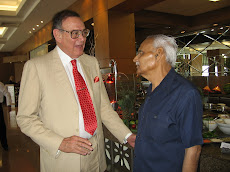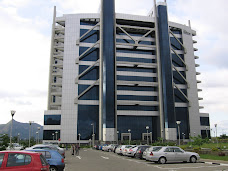Tuesday, May 22, 2007
Monday, May 21, 2007
Misra,D.C.(2007): Can we standardise spelling of e-government terms?
There appears to be a free-for-all environment for spelling the frequently used terms in e-government according to one's fancy including spelling acronyms and abbreviations (eGov: Isn't it cute? Yes, it is. But what does it mean? E-governance or e-government or, much worse, both). This does not befit a fast developing practice and a discipline too. Moreover, a spelling may have profound meaning and a term spelt in two different ways may have two entirely different meanings as is the case, say, with "World Wide Web" and "WorldWideWeb" (one word) or may have governance implications as is the case with "Internet" and "internet."
Three rules could be proposed here: Rule 1. Spell these words the way you like and stick to them. (The down side of this rule is present confusion in spelling e-government terms. The up side is that it has preferred consistency in usage).Rule 2: Never, ever, spell a term differently in the same text or in the same organization, community of practice (COP), etc. (This requires issue of a note of practice, if not standardization of terminology). Rule 3: Develop a reason-based, unambiguous spelling of e-government terms and actively promote their usage.
Illustration to Rule 3: Electronic government are two words. If we wish to contract them, a hyphen is required to be placed between them making electronic-government one word. However, since this one word is also long, defeating the very purpose of the exercise, it requires further contraction. Since "e" as a substitute for "electronic" is widely understood, the word can be contracted to e-government. But this word cannot be further contracted satisfactorily. For example, if it is contracted to e-gov, it makes the meaning ambiguous- does it stand for e-governance, e-government, e-govern or indeed some thing else? As such the proposed spelling is e-government (or E-government at the beginning of a sentence), which requires to be consistently promoted.
"Internet" or "internet"?
"Internet" (with upper case "I") is a network of networks which hosts the World Wide Web which is surfed by us day in, day out. Internet is unique. While "internet" is non-existent entity so far except that some writers have started using the term "internet" for "Internet" (perhaps under the (mistaken) impression that it should be so spelt because it has become commonplace like telephony or electricity). There is however a deeper significance in the difference in spellings. Shannon in International Herald Tribune reports that with "internet" (with lower case "i") International Telecommunication Union (ITU), a United Nations agency, wants to lower-case the word Internet as a matter of official policy so that it could take over the governance of Internet (Shannon, Victoria (2006): What's in an 'i'? Internet governance: UN agency reconsiders its role as countries jockey for influence in industry, International Herald Tribune, December 3, http://www.iht.com/articles/2006/12/03/technology/btitu.php?page=1)].She reports that some of the 2,100 participants at the union's highest-level strategy meeting, which convened for three weeks in November 2006 in Antalya, Turkey, "saw the move as the latest in a long-running effort by the organization to control the Internet, this time through a subtle yet symbolic imprint on the most powerful communications and commercial tool of the 21st century." Yoshio Utsumi, who turns over his office as secretary general of the agency to Touré in January, had called the Internet a "utility" to be managed for the public good.
"World Wide Web," "world wide web" or "WorldWideWeb"?
Since the "World Wide Web," the universe of information over the Internet, like the Internet, is unique, it should be spelled as "World Wide Web" and not as "world wide web." More importantly, the three words "World Wide Web" should not be combined to make word "WorldWideWeb" as this (one word) was the first Web client, a browser-editor written in 1990 that ran on a Next machine. According to Tim-Berners Lee, the inventor of World Wide Web, "Much later it was renamed Nexus in order to save confusion between the program and the abstract information space (which is now spelled World Wide Web with spaces)." (The WorldWideWeb Browser, http://www.w3.org/People/Berners-Lee/WorldWideWeb.html)
Other E-words
Other e-words could be added. A beginning has to be made some where. Any view on the issue?
Dr D.C.Misra
May 21, 2007
Three rules could be proposed here: Rule 1. Spell these words the way you like and stick to them. (The down side of this rule is present confusion in spelling e-government terms. The up side is that it has preferred consistency in usage).Rule 2: Never, ever, spell a term differently in the same text or in the same organization, community of practice (COP), etc. (This requires issue of a note of practice, if not standardization of terminology). Rule 3: Develop a reason-based, unambiguous spelling of e-government terms and actively promote their usage.
Illustration to Rule 3: Electronic government are two words. If we wish to contract them, a hyphen is required to be placed between them making electronic-government one word. However, since this one word is also long, defeating the very purpose of the exercise, it requires further contraction. Since "e" as a substitute for "electronic" is widely understood, the word can be contracted to e-government. But this word cannot be further contracted satisfactorily. For example, if it is contracted to e-gov, it makes the meaning ambiguous- does it stand for e-governance, e-government, e-govern or indeed some thing else? As such the proposed spelling is e-government (or E-government at the beginning of a sentence), which requires to be consistently promoted.
"Internet" or "internet"?
"Internet" (with upper case "I") is a network of networks which hosts the World Wide Web which is surfed by us day in, day out. Internet is unique. While "internet" is non-existent entity so far except that some writers have started using the term "internet" for "Internet" (perhaps under the (mistaken) impression that it should be so spelt because it has become commonplace like telephony or electricity). There is however a deeper significance in the difference in spellings. Shannon in International Herald Tribune reports that with "internet" (with lower case "i") International Telecommunication Union (ITU), a United Nations agency, wants to lower-case the word Internet as a matter of official policy so that it could take over the governance of Internet (Shannon, Victoria (2006): What's in an 'i'? Internet governance: UN agency reconsiders its role as countries jockey for influence in industry, International Herald Tribune, December 3, http://www.iht.com/articles/2006/12/03/technology/btitu.php?page=1)].She reports that some of the 2,100 participants at the union's highest-level strategy meeting, which convened for three weeks in November 2006 in Antalya, Turkey, "saw the move as the latest in a long-running effort by the organization to control the Internet, this time through a subtle yet symbolic imprint on the most powerful communications and commercial tool of the 21st century." Yoshio Utsumi, who turns over his office as secretary general of the agency to Touré in January, had called the Internet a "utility" to be managed for the public good.
"World Wide Web," "world wide web" or "WorldWideWeb"?
Since the "World Wide Web," the universe of information over the Internet, like the Internet, is unique, it should be spelled as "World Wide Web" and not as "world wide web." More importantly, the three words "World Wide Web" should not be combined to make word "WorldWideWeb" as this (one word) was the first Web client, a browser-editor written in 1990 that ran on a Next machine. According to Tim-Berners Lee, the inventor of World Wide Web, "Much later it was renamed Nexus in order to save confusion between the program and the abstract information space (which is now spelled World Wide Web with spaces)." (The WorldWideWeb Browser, http://www.w3.org/People/Berners-Lee/WorldWideWeb.html)
Other E-words
Other e-words could be added. A beginning has to be made some where. Any view on the issue?
Dr D.C.Misra
May 21, 2007
Subscribe to:
Posts (Atom)



